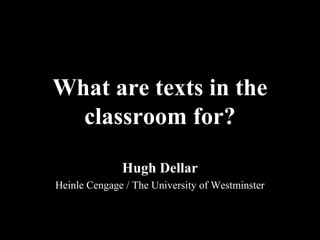
What
- 1. What are texts in the classroom for? Hugh Dellar Heinle Cengage / The University of Westminster
- 2. 1. What’s your favourite text for use in the classroom? Why? 2. What do you normally get students to do before, during and after they read? 3. What do you as a teacher do while they are doing these things? 4. In real life, when do you talk about texts - and what do you say?
- 3. Carol! She’s the best! Lesson 1
- 4. What do you do if you don’t know a word? Lesson 2 Look it up in a dictionary!
- 6. Twig / branch / leaf To acclimatise oneself Orangutan treacle
- 7. Philip Kerr: good readers are simply good language knowers! Lesson 3
- 8. Assessing Reading by J. Charles Alderson Lesson 4 Even if there are separate skills in the reading process… it appears extremely difficult, if not impossible to isolate them for the sake of testing or research. What appears to matter [for being a quick reader] is the massive over-learning of words and much recognition practice in transferable and interesting contexts, in order to ensure quick access during reading.
- 9. DELTA lesson Making leaflets - or paper airplanes! Lesson 5
- 10. I know what an index is! Lesson 6
- 11. Things I used to do and believe • Use lots of authentic materials. • Teach skimming and scanning skills. • Tell students not to worry about the words they didn’t know. Just get the gist - and that’s it! • Get Int. students to guess meaning all the time. • Cut up texts into pieces for students to re- construct. • Ask too many comprehension questions. • Use texts primarily for skills rather than for language.
- 12. •Skilled language users know more language and more about how that language is used. •EFL Ss. Are generally skilled language users in L1 - they just don’t know English. •Skills are not clearly separable - or teachable! •Many of the ‘skills’ we teach are not authentic to Ss.’ experience - they’re particular to classrooms. •Authentic texts are not authentic to the classroom •Ss’ reason for doing skills is to learn language. A summary, of sorts:
- 13. What are texts in the classroom for? • To help us teach useful language • Alternative viewpoints • Humour • Generate discussion • Peace and quiet!
- 14. Good texts… • are about something - and ideally cover a number of issues which students can respond to • introduce an alternative viewpoint to the Ss and T. (perhaps about Britain - advantages of this) • have personal stories you can respond to. • may be funny, but not only funny. • are full of re-useable language and are graded. • are authentic for the classroom - not for native speakers!
- 15. Authentic tasks • Did you read this thing about ….? • Did you see …? What happened? • What was he talking about? • What do you think of it / him / her? • What’s on? • Is there anything worth going to? • It reminded me of…
- 16. Follow us on facebook Hugh Dellar & Andrew Walkley